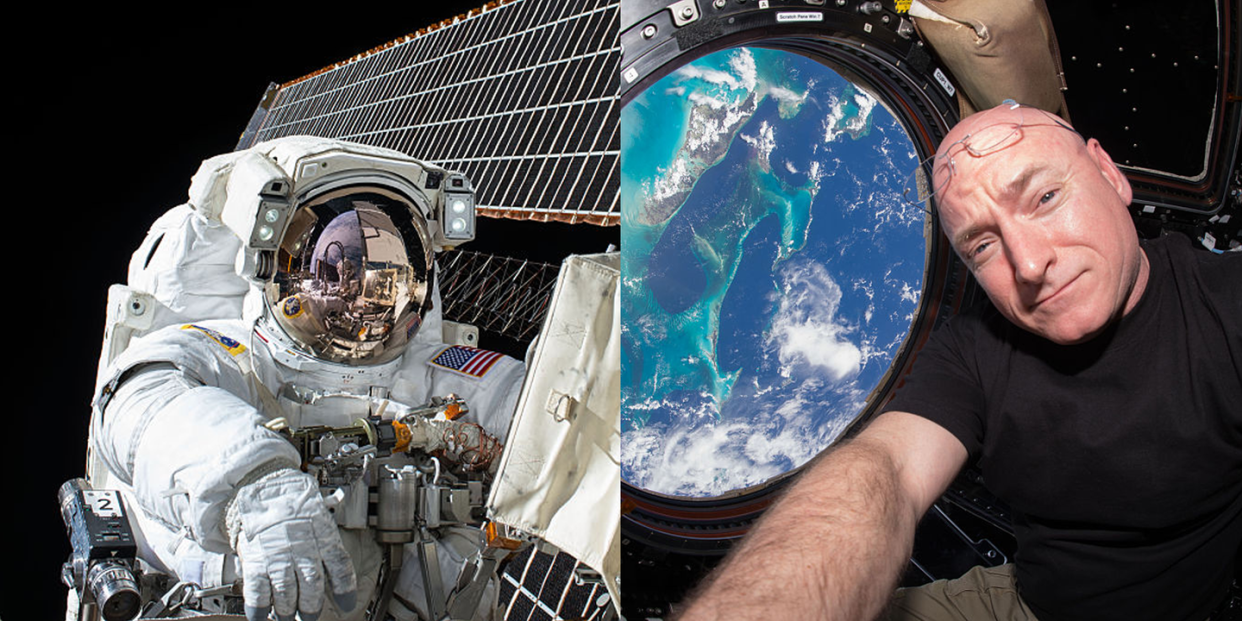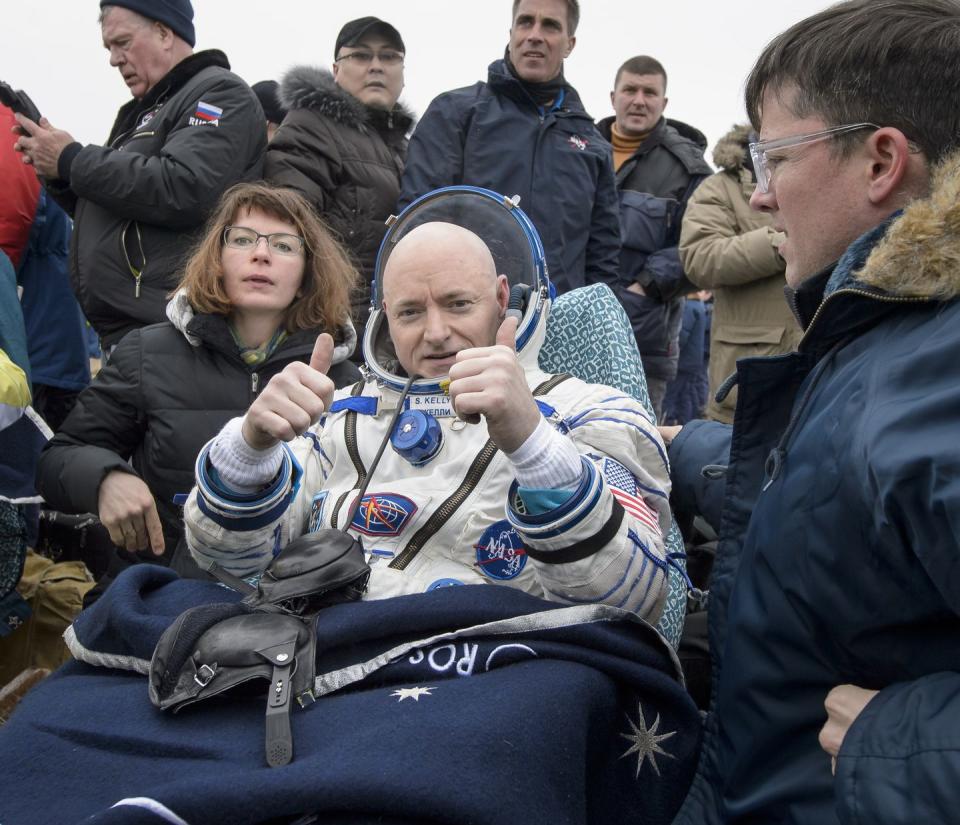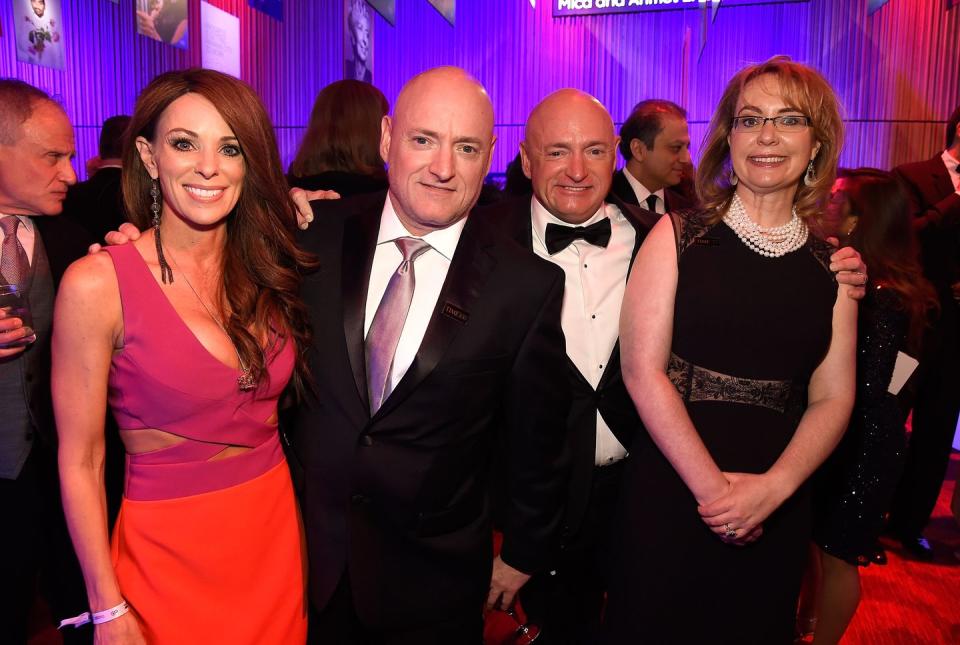Former Astronaut Scott Kelly on Social Isolation: "The Holidays Are Going to Be Hard, No Question"

- Oops!Something went wrong.Please try again later.
Scott Kelly was in his home the other day (weren’t we all), doing the things a retired astronaut does during a pandemic: thinking about going for a hike in the state park nearby, or what he might watch on TV tonight.
His daughter, who is 26, called to chat.
“She was complaining about how she has no social life,” Kelly says.
He had to smile at this, at least to himself. Kelly, 56 was always the little kid’s heroic vision of an astronaut: brave, stoic, and strong. He could withstand anything, and did—including 340 consecutive days in space, the American record. But of his superpowers, the one most useful today is not the ability to endure space debris rocketing toward his head at 35,000 miles an hour.
It is his ability to be alone without losing his mind.
“Samantha, you need to understand that’s the case for everybody on the planet,” he told his daughter.
“Immediately she was like, ‘Oh, yeah! That’s true, isn’t it? I feel so much better,’” he says.
Kelly thinks a lot about isolation these days, and he his using his unique experience of it to help not only his daughter but everyone he possibly can. He’s working with the AARP Foundation and United Health Foundation on a program to remind people there’s help for the isolation that the pandemic demands, especially of older people who might be living alone and not working. For him, this is not just some PSA…

Since his last long duration flight to the International Space Station ended in 2016, Kelly has been open about the fact that the isolation from loved ones (an extreme lack of social life, you could say) was one of the most difficult parts of the endeavor. His time in space has led to all sorts of scientific and technological advancements, but his acute knowledge of what it’s like to feel lonely has become unexpectedly crucial, given that much of the world is isolated right now.
As a result of the COVID-19 pandemic, two thirds of adults say they’re experiencing social isolation and high anxiety, according to a new report released by the AARP Foundation
and the United Health Foundation.
“Living on the International Space Station for nearly a year with literally no way to leave wasn’t easy, so I took precautions for my mental and physical health seriously,” Kelly said in a press release about the partnership. “I’m advocating for individuals, particularly vulnerable older adults, to use available tools to strengthen their social connections.”

Some older adults have reported feeling intimidated by technologies like Zoom and Skype, which are now vital in any attempt to keep up with people outside our homes. “It’s never too late to learn new things,” he said. One resource he suggests, now that he’s affiliated with AARP Foundation, is Connect2Affect.org, where folks can assess if they or loved ones are at risk for social isolation and get tips for boosting connections with others.
Kelly admitted that, while he was in space, he didn’t have to ask for help. “It was mandatory,” he said. “Every two weeks, talking to psychiatrists [and] psychologists to help us get through something that is challenging.” He also found writing down his feelings in a journal to be cathartic.
But now, with coronavirus cases rising across the country as winter approaches, people are going to have to be more proactive. “The holidays are going to be hard, no question,” he said. “There are ways to get through this and mitigate that sense of loneliness by connecting with family and friends as much as you can.”
Connect2Affect.org allows folks to assess if they or loved ones are at risk for social isolation and get tips for boosting connections with others.
In space, Kelly also turned to books for comfort and inspiration, particularly stories about brave men overcoming impossible odds. In Kelly’s New York Times bestselling memoir, he wrote about the strength he drew from reading Endurance: Shackleton’s Incredible Voyage by Alfred Lansing. “I always felt like if my situation ever got really, really bad, I would just read about the crew of Endurance and I would feel better,” he said. “What they had to suffer through—and the leadership and teamwork involved—was just incredible.” Another book he turned to earlier in his career, he told me, was In the Heart of the Sea by Nathaniel Philbrick. It’s about the whaleship of Essex, which inspired Moby Dick. “It’s pretty gruesome,” he said.
If the pandemic were a coin, social isolation would be on one side, and frustration over people you’re quarantined with would be on the other. Again, Kelly dealt with this, while confined to the ISS with only a few colleagues at a time. His advice for this one should go straight to the ears of marriage counselors everywhere.
“I always found that in space, it was important for everyone to feel like they were doing a little bit more than their fair share of the common work,” he said. “Not too much more, because if you do too much, for one, it's hard to sustain. And two, it might make the people you're with feel like they're not good enough or like they need too much help. But as an example, if, with two people on the space station, each person felt like they were doing 51% of the common work, things that you need to take care of—your environment, your house—that makes for a pretty smoothly functioning crew.”
We also spoke briefly about the upcoming presidential election. “I think it's important for everyone to have a [voting] plan, because I've always found with things, especially important things, that if you wait until the last minute, there's too many opportunities for things to go wrong,” said Kelly, who will vote by mail. “It's not mandatory in our country that we vote, but I feel like it's a civic responsibility that we all should take seriously,” he said.
Whether you’re struggling with social isolation, anxiety over the upcoming election, or the myriad other issues 2020 has rained upon us, Kelly looked again to the ISS. As he wrote in his memoir, “It’s a completely unique structure, assembled by spacewalkers flying around Earth at 17,500 miles per hour in a vacuum, in extremes of temperatures of plus and minus 270 degrees, the work of 15 different nations over 18 years, thousands of people speaking different languages and using different engineering methods and standards.” And to us now, he said, “It really inspired me that if we could do that, we can do anything if we put our minds to it.”
COMMANDER KELLY’S COVID-19 TIPS
Kelly said this pandemic is the first time in his life “where the whole planet is engaged in one singular mission with a common goal.” Here are his bottom-line rules for mental success.
Write down your thoughts. “Even though I was doing it for a different reason [in space]—I thought I might want to write a book someday—I also found that it was cathartic to talk about, even if it's to yourself, how you're feeling.”
Have a very set schedule. “And schedule not only what would be considered work, but also hobbies.”
Take time to connect with your friends and family. “When I was on the space station, having the ability to connect with people on the ground was the most important thing for me to be able to keep from feeling isolated and lonely.”
Make your weekends different from your weekdays. “[Otherwise,] there’s a tendency to overwork yourself and have the days run into one another.”
Help when other people need it, and accept help when you need it. That’s teamwork. Teamwork is about picking each other up, elevating each other, and helping out when needed.
Support from readers like you helps us do our best work. Go here to subscribe to Prevention and get 12 FREE gifts. And sign up for our FREE newsletter here for daily health, nutrition, and fitness advice.
You Might Also Like

